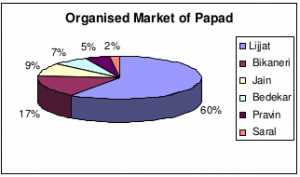Shri Mahila Griha Udyog Lijjat Papad(SMGULP), popularly known as Lijjat was founded in 1959 in an obscure bylane of girgaum by a group of seven women with a seed capital of Rs 80 borrowed from various sources. The success story of this modest cooperative is astounding considering it had a turnover of around Rs. 6.50 billion in 2010, provides employment to around 42,000 people and has 81 branches and 27 divisions all over India.
The humble venture is a success story of colossal proportions and marked the genesis of a cooperative “for the women, by the women and of the women”. This FMCG behemoth is primarly a cottage industry, with urban origins which has spread to rural areas apart from their famous papads they are even involved in manufacturing of masala, soaps and detergent (under SASA brand name) Khakhra and aata. SMGULP has an enviable 60% market share in the organized papad market and about 15-20% market share in the spices and detergent industry. The major competitors are Bikaneri, Bedkar in the papad industry Haldiram and MDH in the spice industry and majors like HLL and P&G in detergents.

Market Share of various competitors in the organized papad market
Image courtesy: (http://image.slidesharecdn.com/projectonbrandawarenessoflijjatpapad-110131155748-phpapp02/95/project-on-brand-awareness-of-lijjat-papad-28-728.jpg?cb=1349786700)
Lijjats Cooperative model
Lijjat owes its genesis and expansion to a close knit cooperative model it follows and believes in the philosophy of sarvodaya or collective ownership. There is no minimum qualification or bias in terms of caste or religion any women over the age of 18 can be a part of this cooperative and are co-owners in this enterprise each member is referred to as sister and are free to choose the work they like.
A few pointers modern corporate houses can pick up from Lijjat are those of dignity of labour and Importance of quality which are sine qua non to any successful entity. Every job be it rolling of papad, packing or preparation of dough is given equal importance and remuneration. Quality is given utmost importance. The supervisors diligently check for the quality, weight and taste of papads. Stringent rules of cleanliness and purity are maintained. The whole manufacturing process is transparent and open to inspection each member is accountable for the work assigned to her. A well documented formula is strictly followed to obtain products which adhere to the strict quality controls benchmarked according to international standards to ensure uniformity in taste , shape and size .
The day to day functioning of the cooperative is entrusted to a managing committee of 21 members decentralization is achieved by appointing sanchalikas who are in charge of various branches and divisions. Any member who aspires to be a sanchalika or a member of the managing committee can stand for the election which are held every three years. Lijjat currently has branches in 17 Indian states and is headquartered in Mumbai all the branches follow the same set of instruction and representatives from various branches meet regularly.

Image courtesy: (http://4.bp.blogspot.com/_t2B9DiUmy9U/TGZ1o9gQOFI/AAAAAAAACwk/RHeM_-LbLVQ/s1600/Flow+Chart.jpg)
Members working at Lijjat earn a fair amount thanks to the equitable and productivity linked distribution of profits which are earned collectively by women working at a particular branch. A member is free to determine the amount of time she will work each branch usually operates from 5.00 am to 10.30 am.
All decisions are based on a broad consensus and each member has a veto right. Only women can be members of this cooperative men are only employed as salaried employees and do not have any rights over the profits earned.
Marketing Strategy
Initially during its inceptions years Lijjat focused on publicity through word-of-mouth and articles in vernacular newspaper. Things have not changed a great deal since then annual expense on advertisement is around 60-80 lakhs or roughly 0.2% of its turnover. Lijjat believes in its core ethos of delivering quality products hence they concentrate more on cost effectiveness and quality rather than on expensive modes of promotion.
Each branch is responsible for marketing and selling products in its area but the surplus from different branches is sold at an all India level. Lijjat sells its products through a wide network of dealers and distributors and has developed a mutually beneficial relationship with its dealers by providing a set commission of 7%.
Another point worth highlighting is Lijjat does not believe in market segmentation they do not have target age groups or income groups they believe in product for all masses and classes. Their products are available in various weight denomination ensuring it is affordable to all.
Women Empowerment
The backbone of SMGULP’s success has been the inclusive growth strategy they have followed. To align with its motive of women empowerment SMGULP uses no machinery at production level computers are only used for accounts and admiration. SMGULP has helped women gain financial and social independence most members are uneducated and belong to families below poverty line SMGULP has taken efforts to promote literacy and computer education amongst the members and their families.
The key learnings that a future manager can take home from SMGULP are those of seamless scalability, importance of quality and an assiduous and flexible workforce which have preserved the company’s core value for over 40 years making SMGULP a paradigm of a successful cooperative model. SMGULP is a remarkable example of what an honest and a dedicated leadership can do to bring women above poverty line and make them bread earners, house owners and give them social security measure like EPF and ESI. In my opinion a sick unit can be brought back to its feet with this kind of equitable and productivity based revenue sharing model which is self-driven and built on trusteeship.
Tags: cooperative model Lijjat Papad SMGULP Women and EntrepreneurshipYou might like reading:

Snehdeep Kalsi of SIBM Bengaluru, wins Maruti Suzuki Colors of Youth Season 5
Bengaluru: Mr. Snehdeep Singh Kalsi of SIBM Bengaluru, takes home a brand new Maruti Suzuki Swift after winning Colors of Youth Season 5. He performed Allah Hoo & Allah Hi Rahem (My Name is Khan) in the grand finale at Kingdom of Dreams, Gurgaon NCR Delhi on 30th March, 2016. After Acoustics – The Country Rockers from D. Y. Patil College […]

Opinion : Say ‘No’ to Tobacco and Smoking
A part of my diary entry on my work, I am sharing this on World No Tobacco Day. Are you into ‘nasha mukti‘(sarcasm for de -addiction) ? This is the way my initiative is referred as. Even after working hard for it, I couldn’t see the appreciation but its still not an issue, if my effort can bring a positive […]






























